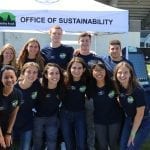The Institute of the Environment seeks a strategic administrator and effective Director of the Office of Sustainability at the University of Connecticut, who will leverage our institutional reputation in sustainability to further advance our national and international leadership in sustainability and the environment.
The Office of Sustainability reports to the Institute of the Environment and works with senior administrators, students, faculty, and staff to set and achieve sustainability goals for the University in the areas of climate action and resilience, energy and buildings, waste reduction and diversion, water resources, food and dining, grounds, purchasing, transportation, open space and natural resource stewardship, and the intersection of these issues with environmental and social justice. The Office develops outreach and engagement programs that feature experiential learning to raise awareness and improve performance around sustainable practices and behaviors related to campus life.
UConn is internationally recognized as a leader in campus sustainability, consistently placing in the top 10 of the Sierra Club’s Cool Schools ranking and possessing a Platinum Rating with the Association for the Advancement of Sustainability in Higher Education’s Sustainability Tracking, Assessment & Rating System (STARS). By convening and leading the Environmental Policy Advisory Council (EPAC), and more recently through its participation on President’s Working Group on Sustainability & the Environment, the Office of Sustainability provides the University community with a focal point for campus dialogue on energy and environmental issues, and has been integral to the successful planning and implementation of environmental sustainability initiatives at UConn.
Reporting to the Executive Director of the Institute of the Environment, the Director advocates for sustainable decision-making across diverse units at the University. From an administrative position, the Director manages a modest staff of professionals and students, and oversees fiscal operations of the Office.
To see the duties, responsibilities and desired qualifications, and application instructions please visit the job posting: https://jobs.hr.uconn.edu/en-us/job/496226/director-of-the-office-of-sustainability-university-staff-professional-2
 Volunteers needed for the 13th annual Football Green Game Day (GGD)! GGD is an event organized by UConn’s Office of Sustainability and UConn Athletics. GGD volunteers are responsible for collecting recyclables from tailgaters prior to the start of the game and promoting environmental awareness to the thousands of UConn Husky fans in attendance! Without volunteers like you, this event would not be possible. This year Football Green Game Day will be held on September 10th, as the Huskies take on the University of Syracuse at Rentschler Field at 7:00pm. Free transportation, dinner, and a ticket to the game will be provided to all volunteers. Please bring your own water bottle and sunscreen! The buses to the stadium will be departing from Hillside Road in front of the Student Union at 2:45 PM. Volunteers can either choose to take one of our buses back to campus around half-time (approx. 9:00 PM) or stay later and take one of the free Husky Roadshow buses back to campus.
Volunteers needed for the 13th annual Football Green Game Day (GGD)! GGD is an event organized by UConn’s Office of Sustainability and UConn Athletics. GGD volunteers are responsible for collecting recyclables from tailgaters prior to the start of the game and promoting environmental awareness to the thousands of UConn Husky fans in attendance! Without volunteers like you, this event would not be possible. This year Football Green Game Day will be held on September 10th, as the Huskies take on the University of Syracuse at Rentschler Field at 7:00pm. Free transportation, dinner, and a ticket to the game will be provided to all volunteers. Please bring your own water bottle and sunscreen! The buses to the stadium will be departing from Hillside Road in front of the Student Union at 2:45 PM. Volunteers can either choose to take one of our buses back to campus around half-time (approx. 9:00 PM) or stay later and take one of the free Husky Roadshow buses back to campus.